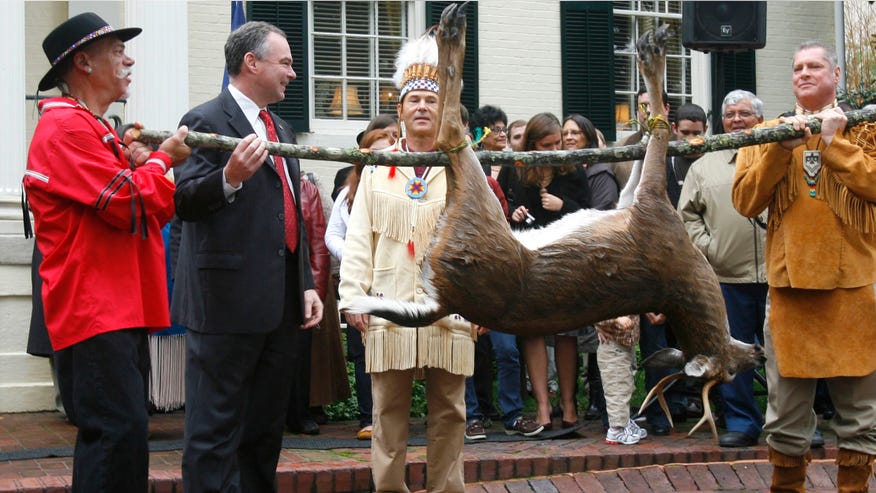11/29/2014

source
Black lawmakers against recognition of Virginia tribe

Nov. 25, 2009: Pamunkey Councilmen Jeff Brown, left, and Gary Miles, hold a deer as their Chief Kevin Brown presents it to Gov. Tim Kaine, second from left, during the annual tax tribute from the Virginia Indians to the Virginia governor. Several members of the Congressional Black Caucus are urging the Obama administration to withhold federal recognition of the Pamunkey tribe in southeast Virginia because of its history of banning intermarriage with blacks.
Several members of the Congressional Black Caucus are urging the Obama administration to withhold federal recognition of a Virginia Indian tribe because of its history of banning intermarriage with blacks.
In January, the Interior Department proposed recognizing the Pamunkey tribe in southeast Virginia, which would make members eligible for special benefits in education, housing and medical care -- and allow the tribe to pursue a casino. A decision on recognition, which would be the first for a Virginia tribe, is due by March 30.
The Congressional Black Caucus members urged Interior Secretary Sally Jewell and Attorney General Eric Holder to hold off until the Justice Department investigates any discriminatory practices by the tribe. Neither department has responded to the request, made in a Sept. 23 letter, according to a spokeswoman for Mississippi Democrat Bennie Thompson, who signed the letter.
The letter cited a report by the Interior Department's Bureau of Indian Affairs that quoted tribal law: "No member of the Pamunkey Indian Tribe shall intermarry with anny (sic) Nation except White or Indian under penalty of forfeiting their rights in Town."
The bureau said there was no indication the tribe had changed its ban, but Pamunkey Chief Kevin Brown responded in a letter to the CBC that the ban has been repealed. He said in an interview that the change was made in 2012.
The Bureau of Indian Affairs said that the significant number of Pamunkey-Pamunkey marriages and efforts to encourage them helped satisfy a criterion for federal recognition: that a predominant portion of the group comprises a distinct community and has existed as one from historical times to the present.
The black lawmakers called the government findings disturbing. "The BIA seems to justify the discrimination and surprisingly cites this as a reason" to recognize the tribe, their letter said.
In addition to Thompson, the letter was signed by 10 other Democrats.
Interior Department spokeswoman Nedra Darling said the agency had received the letter and was developing a response. The Justice Department didn't respond to requests for comment.
Brown told the CBC that the intermarriage ban was rooted in Virginia's culture of racism. "Racial intermixture was raised repeatedly as a rationale to divest us of our reservation and our Indian status," he said.
Brown cited Dr. Walter Plecker, registrar of the Virginia Bureau of Vital Statistics in the first half of the 20th century, who ordered that Indians be classified as "colored" on birth and marriage certificates.
"His rationale was, of course, racial intermixture among the Indians," Brown wrote, adding that the "antiquated and now repealed" tribal law was an attempt to protect Indian identity. "It was never an attack on, or reflective of, ill will toward African-Americans."
Asked if Brown's letter changed anything, Thompson's spokeswoman, LeMia Jenkins, responded in an email: "We are looking forward to a response to the concerns raised in the letter to DOI and DOJ. The issues have not been satisfactorily addressed by BIA and require attention."
The tribal intermarriage law was repealed two years after the tribe had submitted materials to the Interior Department for its bid for recognition.
"We have members on our rolls who are married to African-Americans," Brown said.
Earlier this year, MGM National Harbor and Stand Up for California also raised concerns about the tribe's intermarriage ban and challenged the Interior Department's findings that the tribe deserved recognition. MGM Resorts is building a casino at National Harbor in Maryland's Prince George's County, near Washington and about 120 miles north of the Pamunkey reservation. Stand Up for California is a nonprofit group that's pushed for limits on gambling in that state.
"MGM doesn't want any competition on the East Coast, and we would become gaming-eligible," Brown said, adding that the tribe has no plans to open a casino but will take a look at it.
Gordon Absher, a spokesman for MGM Resorts International, said that the company isn't opposed to Indian gambling.
"Given the increasingly competitive environment for both tribal and commercial casino gaming, these advantages should not be indiscriminately bestowed upon entities that cannot demonstrate, through long-established procedures, that they meet the basic criteria for tribal acknowledgment," he said.
source
No comments:
Post a Comment